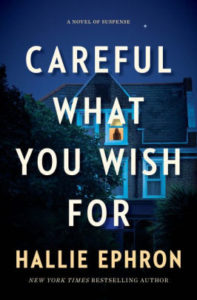 Has the de-cluttering craze made you long for more order and space in your home? Do you dream of perfectly folding everything within reach and having closets that radiate so much serenity they can double as meditation rooms?
Has the de-cluttering craze made you long for more order and space in your home? Do you dream of perfectly folding everything within reach and having closets that radiate so much serenity they can double as meditation rooms?
Or are you perhaps living with a hoarder who can’t get rid of anything and keeps adding to their stash of stuff which expands through your house hour by hour, day by day? Do you feel troubled, squeezed, invaded?
Well, after you read Hallie Ephron’s funny, deep, dark new mystery you might decide to leave well enough alone and get on with your life no matter how cluttered it is or how much hoarding you have to endure.
Ephron fields a heroine, Emily Harlow, who’s started a business helping people cull their stuff, boosted by a clever Internet presence that’s earning her fans and drawing in customers. If you’re not hawking yourself online you’re not going anywhere right now and the author spoofs that reality with finesse.
But helping people with the mess they’ve made of their homes unfortunately makes getting involved in their messy lives all too possible. And it can lead to trouble. Big trouble. That’s exactly what happens to Emily. Two new clients present challenges she never dreamed of and end up bringing the police into her life. In one gripping scene after another, Ephron cannily demonstrates how innocent people can be tricked and even railroaded by sneaky interrogators. That’s something well on display in the Netflix series When They See Us about the Central Park Five.
The dark side and humor are effortlessly blended here. What perhaps makes Ephron’s satire of the Marie Kondo spirit most appealing is the fact that Emily is married to a hoarder and they argue about his habits versus hers all the time. Their interactions are sad and all too realistic, and Ephron’s portrait of a troubled marriage couldn’t be more astutely drawn.
Emily’s husband behaves in surprising ways, given that he’s a lawyer with a sharp mind: when it comes to auctions for unbelievable junk, he’s hypnotized. He’s also way too full of advice, even though it’s good, especially when it comes to the law, which plays a surprising role in this well-plotted crime novel.
Best of all, Hallie Ephron’s tantalizing mystery doesn’t begin with the clichéd corpse, it starts with socks. Yes, socks. Specifically, organizing them as a panacea. That’s something Freud wasn’t thinking about when he wrote Civilization and its Discontents. But maybe he should have.
Lev Raphael teaches creative writing workshops online at writewithoutborders.com. He reviewed crime fiction for a decade at the Detroit Free Press and is the author of twenty-six books in genres from memoir to mystery. His latest mystery is the academic satire State University of Murder.

